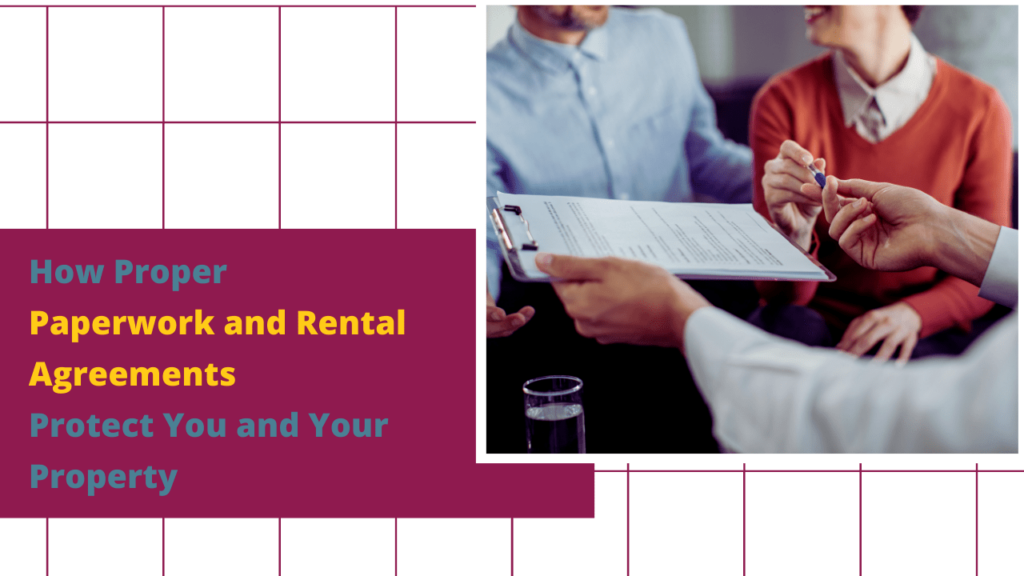
There are multiple ways that you’ll need to protect your investment property when you’re renting out a home in Las Vegas. You need good insurance. You need to focus on preventative maintenance. You need to choose good tenants who will pay rent on time and take care of your investment. You also need to conduct regular walk throughs and comply with all state and federal rental laws.
There’s a lot that goes into protecting your investment, and a lot of it is obvious.
Some of it is subtle.
Like paperwork. Who thinks about paperwork as a method of protecting your rental home? If you’re not thinking about it that way, now is the time to start. All of that paperwork may seem like a chore, but good documentation is absolutely necessary. It protects your interests and it protects your property. It helps you prove damage after a tenant moves out. It helps you file for eviction if a tenant stops paying rent.
The pinnacle of your paperwork, of course, is your lease agreement. It has to be strong. It has to be legally enforceable. And, it has to be compliant with state and federal laws. You can only hold tenants accountable to the lease agreement if you have a strong, compliant lease in place.
We’re diving into the importance of lease agreements and paperwork, and talking about how they help protect you and your rental property.
What Is Paperwork in a Digital Age?
Paperwork does not necessarily involve paper. In our digital society, most of our files are electronic. If there is actual paper involved, it’s likely scanned into a digital file for safekeeping and easy access.
As property managers, we invest in software that makes collecting, tracking, and referring to digital paperwork easy. We can share it, download it, and attach it to reports. If you’re not working with a Las Vegas property manager, make sure you have a system in place to manage your digital files. Keeping everything in paper or physical files is risky, and it’s also inefficient. It doesn’t have to be a complex system, in fact, it shouldn’t be. You’re simply making sure everything you may need is accessible to you, whether we’re talking about the lease or your ledger or an insurance policy.
Lease Agreements
Your lease agreement is where you protect your property. It’s also where you protect yourself and where you provide protection for your tenants.
Your lease needs to be specific to Nevada and its rental laws. You don’t want to simply download a template that comes from some random internet site. If you’re looking for a sample off of which to base your own lease, talk to a landlord and tenant attorney or contact a property management company. You don’t want to put your investment at risk by using the wrong lease.
The lease does not have to be book-length. But, it does have to include all of the important elements, including:
- Contact information for you and your tenants. If your property is being professionally managed, make sure that your property manager is listed as the point of contact on your lease.
- Lease terms. You need a start date and an end date.
- Rent collection policies. You want to make sure your rental agreement sets forth how much rent is due, when it’s due, when it’s considered late, whether there are late fees or other consequences, and how rent should be paid.
- Security deposit information. Your lease should refer to how much of a security deposit you collected from your tenant and where you’re holding it. You’ll also want your lease to be clear on what a tenant needs to do at the end of the lease term to ensure they get their full deposit back.
- Processes and procedures that the tenant may need to know, specifically how to report maintenance and repair needs.
- All of the required disclosures and addenda such as information on mold, bed bugs, and lead.
- Pet policy.
- HOA rules and regulations, if applicable.
There’s a lot more your lease needs to include in order to be legally compliant in Nevada. Make sure you’re using a document that is recognized by the courts. You’ll need easy access to your lease if you find yourself having to evict a tenant or settle a question or a dispute with your tenants.
Rental Applications Protect You Against Unqualified Tenants
Screening and approving tenants starts with a rental application. You’ll want to provide a list of qualifying rental criteria to potential applicants before they decide to apply. That’s another piece of paperwork that’s particularly important during the leasing period. Every applicant age 18 years of age or older needs to complete your application.
Here are some things to remember about your application:
- You are collecting sensitive information about your prospective tenants on your application, and you’ll need to follow all the requirements of the Fair Credit Reporting Act, which dictates how that information is kept and used. If you deny a tenant based on credit, there’s specific language you’ll need to use in your written letter.
- It’s important to get a signature from your applicants granting permission for you to conduct a background check, credit check, and reference check.
Best practices recommend that rental applications are kept on file for at least three years, even if you reject an application. When you approve a tenant, you’ll want to keep the paperwork for as long as the tenancy lasts if you go beyond the three years.
Accounting and Financial Paperwork
You need to track your finances accurately and in great detail. You should have income and expense reports available at any time. If you’re still using a paper ledger, it’s time to upgrade your accounting system. Invest in some software that can help you organize your money and track everything in preparation for taxes, security deposit returns, rent increases, and maintenance budgets.
Accurate and detailed accounting protects you in a number of situations. It allows you to document what you’re earning and justify the tax deductions you’re sure to take when it’s time to file. You’ll also be able to demonstrate when rent was paid and when it wasn’t. If you find yourself needing to pursue an eviction action, you’ll be expected to prove that the tenant has defaulted on the lease agreement by not paying rent. Those rent rolls that you’re so carefully keeping will help you get your property back if that eviction situation happens to arise.
With the right system in place, all of your accounting paperwork is at your fingertips and securely stored. It’s worth your investment.
Maintaining Maintenance Paperwork
Rental properties require a lot of maintenance, and maintenance generates a lot of paperwork. You’ll find yourself with estimates, invoices, walk through reports, warranties, and repair requests. Make sure you have a good system for organizing them.
Smart investors will track all maintenance and repair needs and responses. When you create documentation that shows the work that was needed and when it was completed, you’re protecting the property and all of the systems in it. It also helps you plan and budget for preventative maintenance. You can track how long it’s been since the roof was inspected or the HVAC unit serviced.
Emergency repairs are likely to be reported by phone. Routine repair requests, however, can come to your attention in writing. That method of maintenance reporting will contribute to your tracking and documentation. You should also keep track of invoices. If there’s a dispute with your tenant about a repair that they say was never made, you can use this paperwork to prove that the repair was indeed made.
Documenting Tenant Correspondence
 There may be emails, texts, and notes from phone calls that you have with your tenant. File all of these in case you need to access them later. You don’t want to delete anything when it comes to tenants and their correspondence. If there’s a dispute about late fees when rent is late, push back about the security deposit you’ve withheld, or a complaint that maintenance was not completed as requested, you’ll need to document and demonstrate what was discussed.
There may be emails, texts, and notes from phone calls that you have with your tenant. File all of these in case you need to access them later. You don’t want to delete anything when it comes to tenants and their correspondence. If there’s a dispute about late fees when rent is late, push back about the security deposit you’ve withheld, or a complaint that maintenance was not completed as requested, you’ll need to document and demonstrate what was discussed.
You also want to keep:
- Lease renewal offers
- Delinquency notices
- Requests for information
Keep track of what you and your tenants discuss. If it’s an in-person conversation or a phone call, it takes just a few minutes to jot a note in their file.
Renting out a property in Nevada does not have to be risky, but it can become risky if you’re not collecting and keeping the correct paperwork. Protect yourself and your property by documenting everything. Use and enforce a strong lease.
One of the best ways to ensure you have all of the paperwork and documentation you need is by working with a Las Vegas property management company. We have systems in place and the best technology available to ensure that your lease agreement is compliant and enforceable. We maintain files with leases, rental agreements, notices, correspondence, maintenance requests, and other documents. Our job is to protect and manage your asset.
We can do that! Please contact us at New West Property Management. Our team expertly manages residential rental homes in Las Vegas and throughout Clark County, including Henderson and North Las Vegas.
